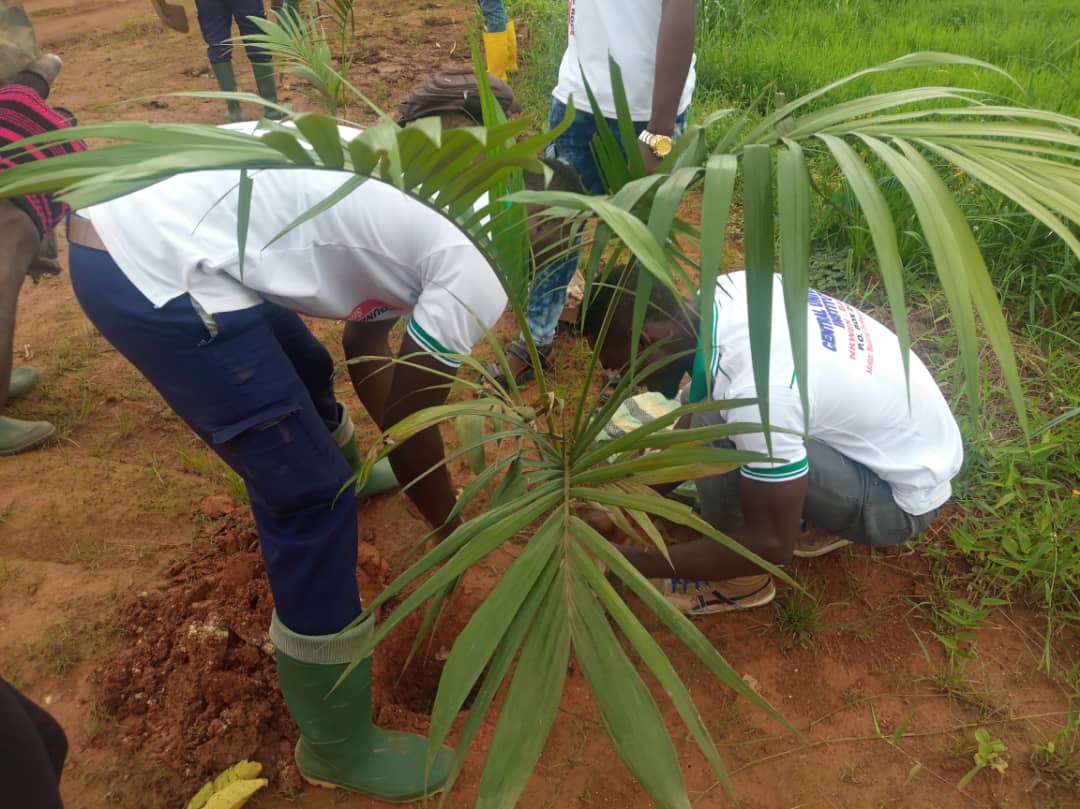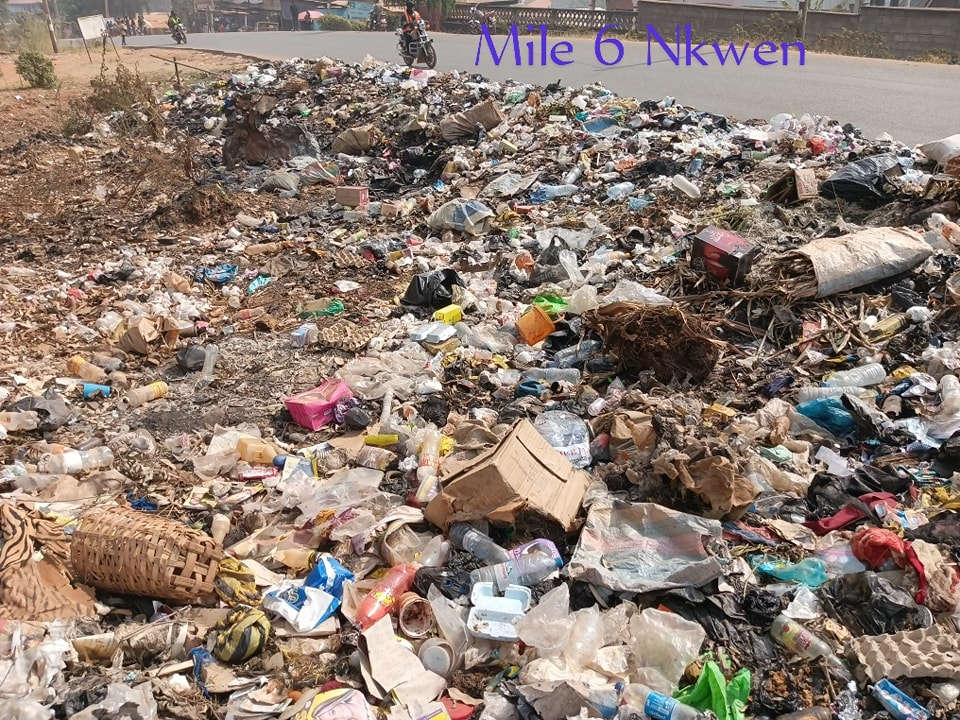CAEPA Engages Community Towards Climate Justice

For over a span of 12 months, Community Agriculture and Environmental Protection Association has been at the fore front championing activities to address disasters that has notably been plaguing the city of Bamenda, chief town of the North West Region, which is presently host to thousands of persons, mostly women and children who have fled the crisis and are now internally displaced in Bamenda.
For years, the city of Bamenda has been affected by floods and landslides. A situation that often leaves devastating effects on the victims affected, in this case, mostly women who double as breadwinners of their families, rendering them poverty stricken. Most times, the floods and landslides consume lands, livestock, houses, goods and inflict upon them, sicknesses.
In a bid to address this issue, empower these women and give them a voice to contribute to their wellbeing, CAEPA launched an initiative which she dubbed "Strengthening Women Voices in Disaster Risk Governance in Bamenda City". The initiative has been mapped out for Bamenda I,II and III municipalities which are evidently, disaster prone areas.
🎯 Strengthening Women Voices in Disaster Risk Governance
A comprehensive initiative targeting Bamenda I, II, and III municipalities to empower women and give them a voice in disaster risk reduction and governance.
The very first step in carrying out an initiative of this magnitude that if mismanaged, can lead to the loss of lives, CAEPA sort to take a deep look into the limitations that exists in already laid down laws and policies by imploring the services of a professional consultant who has been trained and has the mandate to analyze gaps in policies and practices that deters any progress geared towards disaster risk reduction in the city. A total of 20 community stakeholders with knowledge on disaster risk reduction were manned to review disaster management documents.
Direct reflection of field findings on disasters
CAEPA's stance on disaster management
Addressing floods and landslides solutions
20 experts reviewing disaster documents
Haven assessed these issues on ground, CAEPA went ahead to produce some advocacy tools which are relevant in the fight against environmental disasters. They include an Issue Paper, a Position Paper and a Policy Brief, all being a direct reflection of field findings documented to address the issue of floods and landslides in the city of Bamenda.

As a community based organization that prioritizes community approaches, CAEPA organized community dialogues on disaster preparedness with women participants drawn from Ngomgham, Mulang, Ntenefor, Below Foncha and Mile 4 Nkwen- areas known for constant disaster outbreaks. These women who were identified from 11 district groups were engaged in discussions around early warning signs, causes, impact as well as preventive measures that can be taken to address disasters.
During the sessions, these women expressed lack of awareness to the causes of disasters. They equally hitted hard on their remarkable absence on decision making tables whereas they are the most to be affected at the advent of disasters and can better relay their experiences. The concerns raised amplify the need for a gender responsive approach to be implored in tackling disaster management at council and regional level. CAEPA went on to engage 40 women leaders from various quarters to effectively respond and mitigate the outcomes of disasters in their various communities. To realize sustainable results, CAEPA implemented the monthly meeting approach to constantly track down progress and address upcoming concerns faced on the field. This platform equally laid down the opportunity for interactions and sharing of personal experiences and challenges encountered, to be carried out. Through this forums, these women gained knowledge on effective advocacy strategies on disaster preparedness.
CAEPA has made use of radio talk shows through the services of the state media and one private station, to raise public awareness on climate change and the impact of environmental concerns like floods and landslides. To realize a more lasting impact, 20 senior journalists were trained to be risk rescue reporters in the region. Also, over 2000 flyers and posters were printed to enhance information and education of the masses. CAEPA has reached over 3817 females and 2625 males through awareness raising sessions in schools, social groups and churches.
🌿 Environmental-Friendly Practices
CAEPA emphasizes the need to engage in environmental friendly practices that help reduce the risk of disasters, addressing human practices that contribute to floods and landslides.
One fame message that is being passed across is the need to engage in environmental friendly practices that help to reduce the risk of disasters. This is due to the fact that, it has been discovered that some human practices greatly contribute to the outbreak of disasters. Practices such as poorly disposed waste found in rivers, inadequate drainage systems, and poorly constructed structures go a long way to aid the occurrence of floods and landslides. While it is noted that heavy rains and the sloppy topography contributes to floods and landslides respectively, CAEPA choses to emphasize on the need to educate the public on the essence of doing-away with practices that aggravate the occurrence of disasters.
Haven registered successes in using every existing platform, CAEPA organized a consensus council meeting bringing together district heads to review and validate the policy proposal documents. This meeting which had 36 persons actually recorded the presence of 21 females and 15 males. This paved the leeway for the convening of the high leveled regional dialogue that took place at the conference hall of the Bamenda II council registering the esteemed presence of the president of the Regional Assembly, Mayors, representatives from the ministry of environment, traditional and religious leaders, women leaders and quarter heads. The grand occasion was organized to consolidate the findings and proposals that CAEPA alongside the community had realized. During the meeting, the Programs Coordinator Fenwi Linda, officially handed over the documents to the regional assembly, which was received with appraisal and a pledge to look into the issues of floods and landslides in the city, with the implementation of effective policies.
One of the remarkable outcomes of this project is the creation of community based task forces who have volunteered to act as environmental-police officers to ensure that the masses remain glued to their commitment to stick to environmental friendly practices.
I have seen so many changes in the community. The throwing of diapers and plastic papers in flowing rivers has reduced. When you look at the drainage system, it has remained clean till this moment. This is a huge success because it will stop the environmental issues we have been having. As a member of the task force in my community, we shall continue to look out and speak out till everybody desist from the harmful practices that we carry out and later punish ourselves.
Immediate beneficiaries of this project say that, they are happy with the outcome of this project in their communities. This is just one of the so many testimonies and commitment that CAEPA has been able to realize within 12 months of project implementation made possible through funds from the Common Wealth Foundation.
